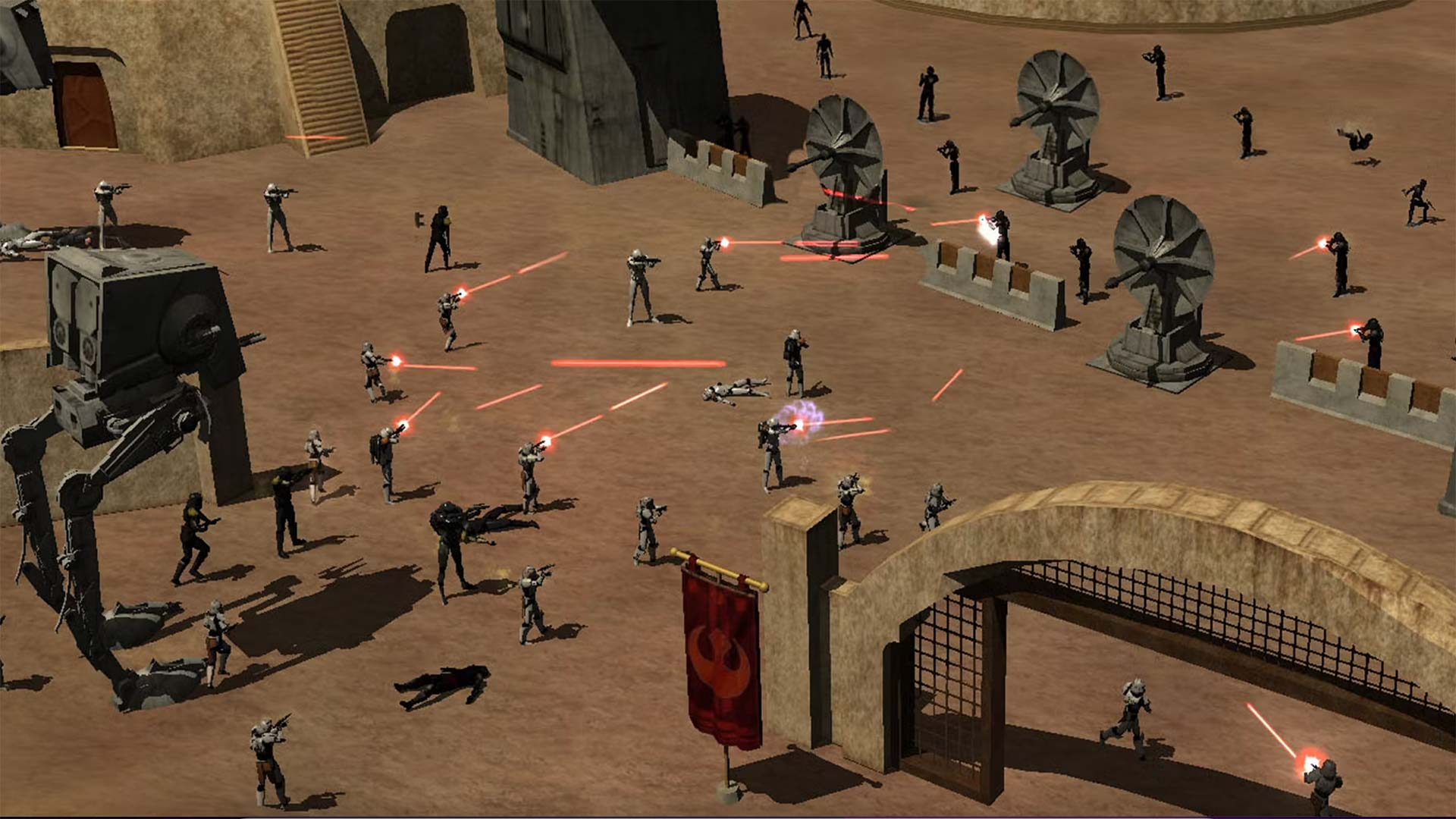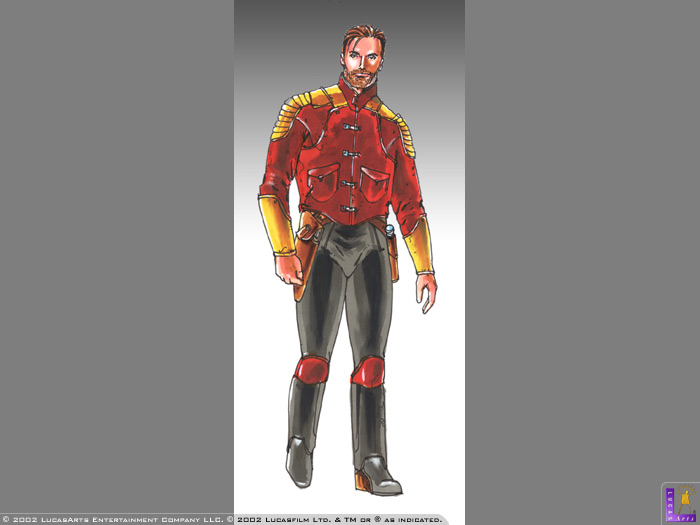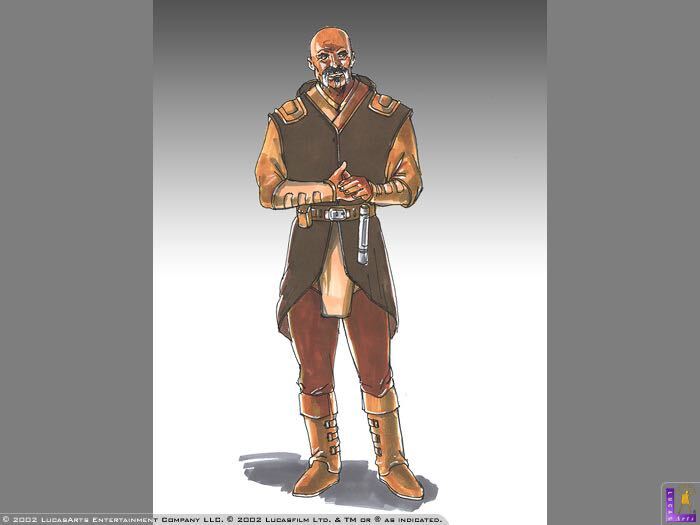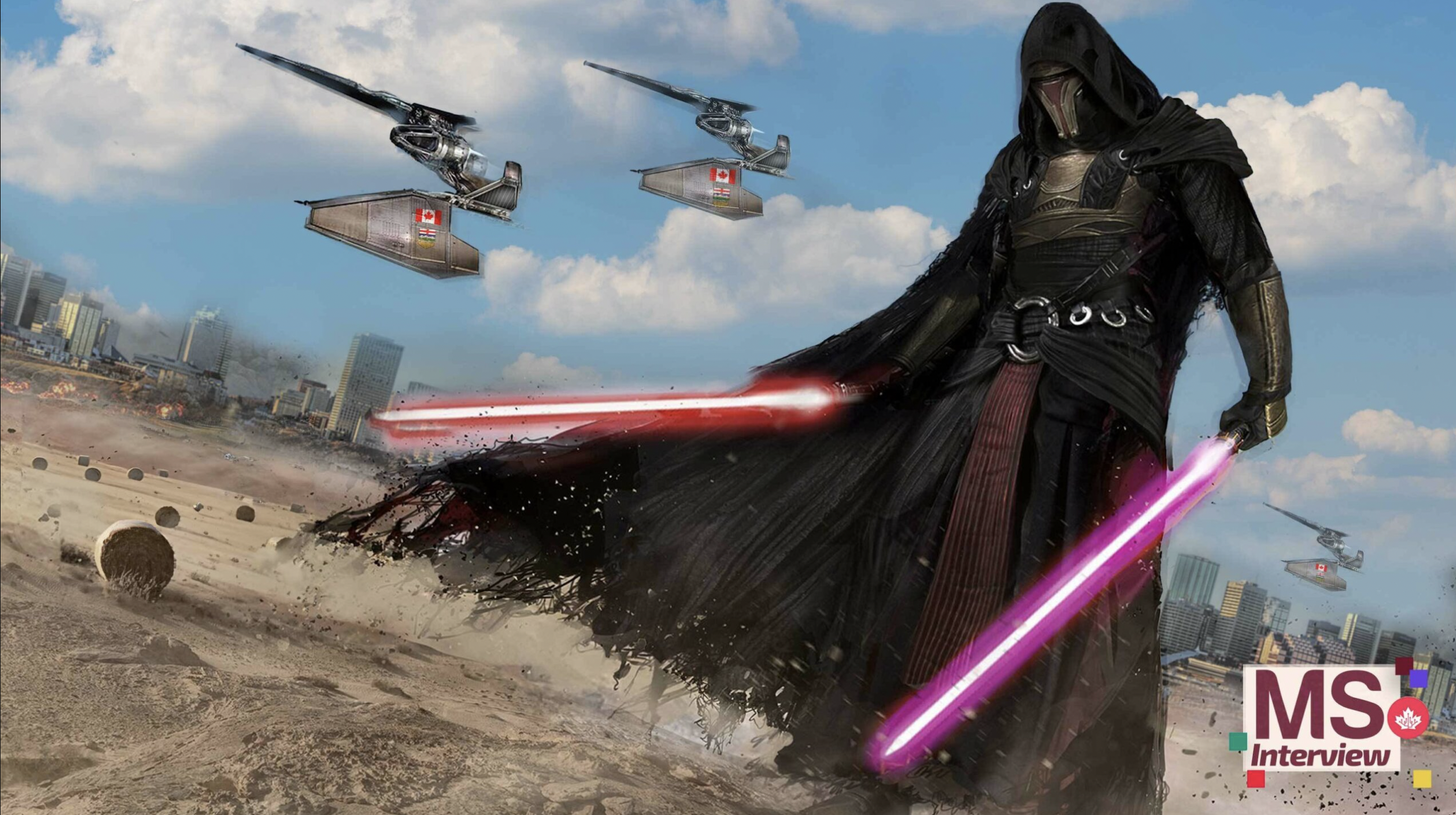
If you can believe it, Star Wars: Knights of the Old Republic is already 20 years old.
Released on July 15th, 2003, the BioWare Edmonton-developed RPG was groundbreaking for many reasons. It was LucasArts giving a lesser-known studio in Canada a crack at one of the most beloved franchises of all time. It was set 4,000 years before the Skywalker Saga, a far cry from the majority of Star Wars media ever since. It told an ambitious, choice-driven story that, to this day, holds up for its strong writing and remarkable twist.
And, above all else, it’s still regarded as one of the greatest games of all time.
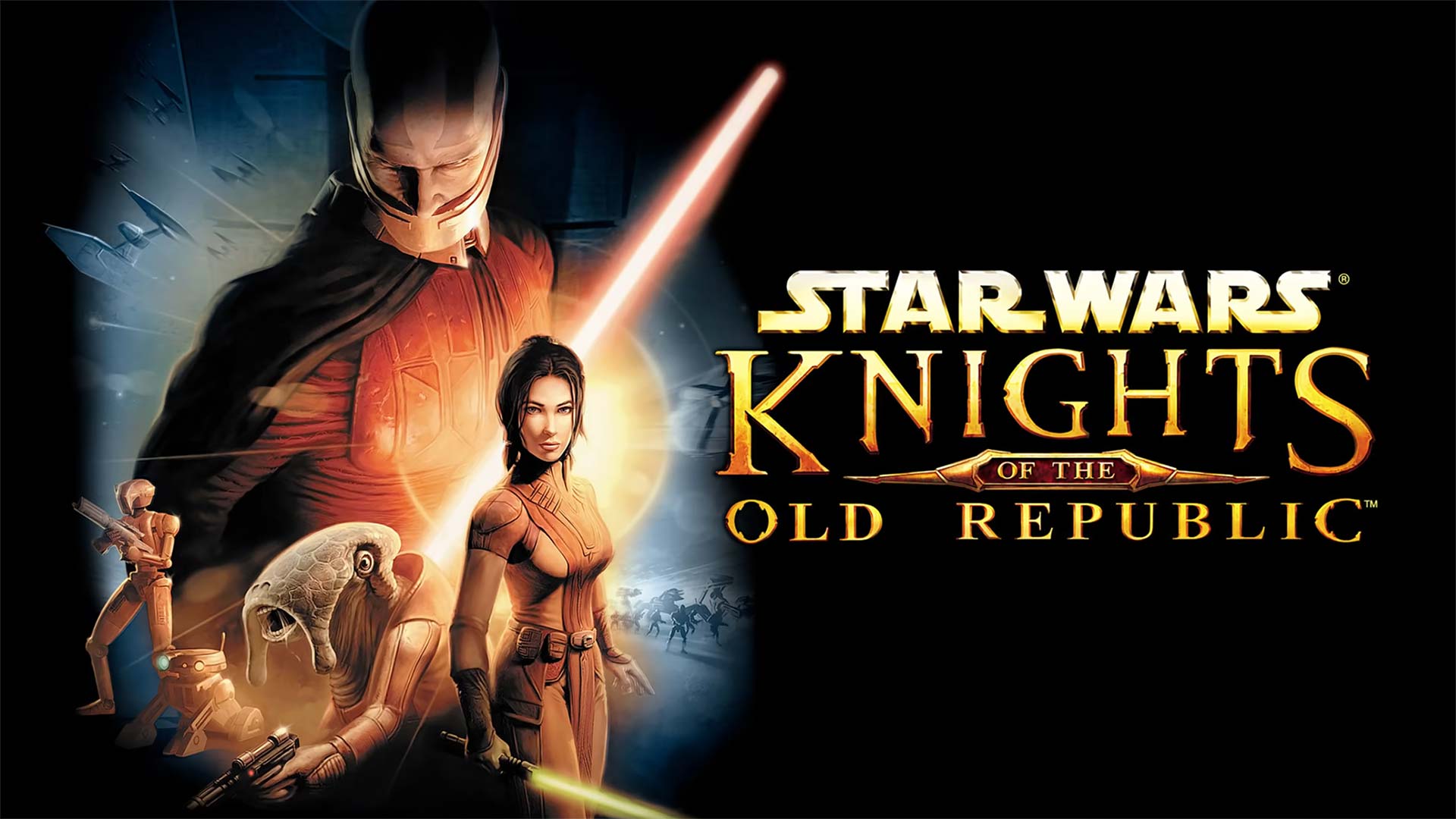 To commemorate 20 years of KOTOR, MobileSyrup has put together an extensive two-part feature on the beloved RPG. The first story focuses entirely on the making of the game, as told by several of its key creators: James Ohlen (lead designer), Drew Karpyshyn (senior writer), Aaryn Flynn (programmer), Steve Gilmour (lead animator), John Gallagher (director of concept art) and Jennifer Hale (the voice of Bastila Shan).
To commemorate 20 years of KOTOR, MobileSyrup has put together an extensive two-part feature on the beloved RPG. The first story focuses entirely on the making of the game, as told by several of its key creators: James Ohlen (lead designer), Drew Karpyshyn (senior writer), Aaryn Flynn (programmer), Steve Gilmour (lead animator), John Gallagher (director of concept art) and Jennifer Hale (the voice of Bastila Shan).
This second part, meanwhile, is all about the 20 years since. What have the creators been up to? What are their thoughts on modern Star Wars? What’s it like to have helped establish the Canadian game development scene as the $5.5 billion industry it is today, the third largest of its kind in the world in which beloved games like Mass Effect (also from BioWare), FIFA, Assassin’s Creed, Far Cry, Dead by Daylight, Cuphead and Celeste were made? We touch on all of that and more.
We’ve rounded up their thoughts, as well as where you can keep up with some of KOTOR‘s other key creators. Read on for more!

Image credit: Casey Hudson
Casey Hudson
Role on KOTOR: Producer/project director
Games he’s since worked on: Mass Effect trilogy, Anthem
Where he’s at now: Humanoid Studios, a nascent studio based in Edmonton and Vancouver
Current role: Founder/CEO overseeing a new sci-fi IP
James Ohlen

Image credit: James Ohlen
Role on KOTOR: Lead designer
Games he’s since worked on: Dragon Age: Origins, Star Wars: The Old Republic
Where’s at now: Archetype Entertainment (Austin, Texas)
Current role: Studio head overseeing a new sci-fi IP
[Wizards of the Coast-owned Archetype is working on a yet-to-be-revealed “multi-platform role-playing game set in a brand new science fiction universe.” However, the developer isn’t ready to reveal further details, so we’ve tweaked some of Ohlen’s questions accordingly.]
Reflecting on KOTOR‘s legacy: It’s kind of unreal. Sometimes I’m just like, ‘Wow, I’ve had such a blessed career.’ When I look back at my younger self living in shitty town Grande Prairie, with like no prospects whatsoever, except my incredible love for Star Wars and D&D, I never thought that this would be where I would end up. So it’s all a little bit humbling. That was one of the values at BioWare: humility. It’s just such an important value. Here’s the thing: when I look at KOTOR, yes, people love that game, but it was the work of a ton of different people who had an impact on it. Plus, when I look at it, there are probably other people out there who could have done the same thing in a different way than I had. So it’s kind of like I had an opportunity, I was a good pick for that [project], but I also got lucky to be given the opportunity. So I just look at it as I have a blessed life, and I should stop complaining. [laughs] I’m very honoured and humbled to have been a part of Star Wars in that way.
Because I still absolutely love Star Wars. I haven’t religiously watched a show as soon as the episode comes out since I don’t even know, like 20 years, 30 years? But with The Mandalorian, it’s like ‘Oh, it’s out, it’s out!’ Good Star Wars still gets me. Oh, and Andor! Oh my god, I couldn’t believe it! Andor was so awesome. My son is 14 years old — he’s a fan of The Clone Wars and the prequel trilogy so we like to argue a lot. [laughs] But we both love it. Yeah, we’re getting really good Star Wars TV right now. I think people are getting spoiled when they complain. I’m like, ‘yeah, sure, there’s some dumb Star Wars TV shows and some missteps, but we got The Mandalorian and Andor, so stop your whining! [laughs]”
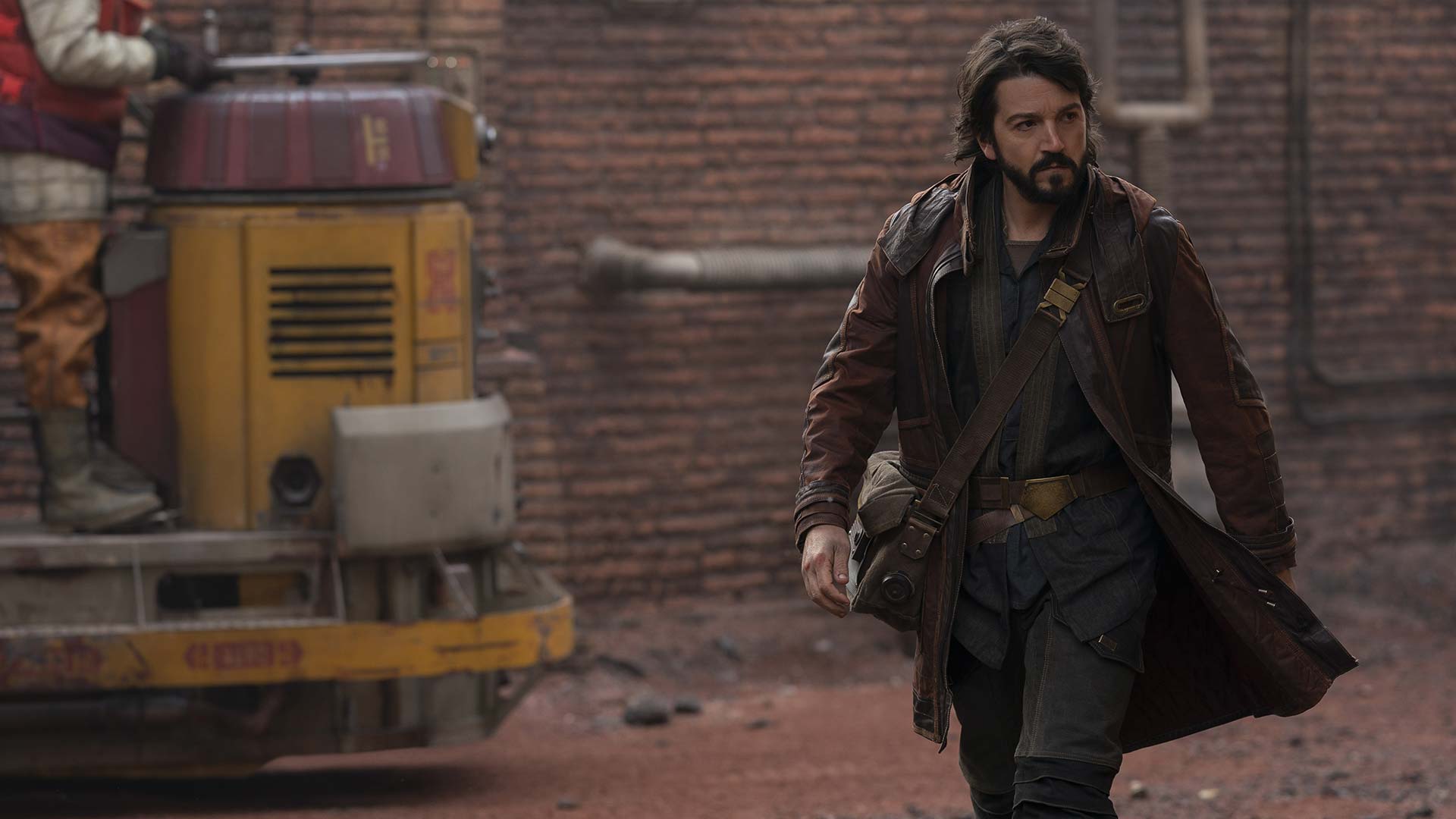
Andor is one of the most acclaimed Star Wars works in years. (Image credit: Disney)
On his approach as a leader on games like KOTOR: The way it would go when I worked on the games, I do the story outline, here’s going to be the main story path, and then I would write a D&D module essentially. Here are all the maps and all locations, here’s where all the characters that are talking are going to be. But then I would really give it [to the writers.] Like, I didn’t make HK-47 funny. It was [writer] Dave Gaider. What I liked to do is get great talent, and then I give them a box to work in, and then I just shut the hell up until they give me their great work. [laughs] So that’s always been successful for me. George Lucas felt the same way. I hate when executives try to butt into something that they don’t understand or are an expert in, and I don’t want to do the same thing. When David Gaider is his writing or Drew Karpyshyn is writing, they’re better writers than me. Why am I gonna tell them how to write? Now, I’m gonna tell them, ‘I want a character here or an arc here or whichever and it needs to lead into this, and here’s the area they’re going to be in,’ but I think what you want is to just create some guardrails for your creatives so they’re moving forward. Because if you don’t do that, then they spin around like, ‘What are we supposed to do?’ But if you give them a plan that is detailed enough that they what they’re supposed to do but not so detailed that they feel like they’re being constrained.
On helping usher in Canada’s massive game development scene: It was a lot of work! That’s the thing: for the first decade of my career, I didn’t really have time to think like that. It was just like once the game was done, it was like ‘Oh, did it win some awards? That’s cool. Oh, the Metacritic is great, that’s awesome.’ And then on to the next game. Also, Ray Muzyka is a very demanding man, and he always lives by the mantra of ‘you can always be better.’ So it was always like, ‘It didn’t matter how the game was, we’re going to do better on the next game.’ And since I never had any kind of father figure, he instilled that in me, just like my mum. I very much have the two main figures in my life be never satisfied, always perfect [laughs]. But no, honestly, it did help shape me. I think for a studio to be successful, you have to have a culture where criticizing the work is acceptable; not criticizing the person but criticizing the work, which is hard because often people will tie the work into themselves. But Ray [Muzyka] and Greg [Zeschuk] did a great job of creating a culture in that regard.
“It fills me with pride that we were a little Canadian company — who knew we could pull that out of our butts?” — Steve Gilmour on KOTOR.”
What he misses most about Alberta: The Edmonton Oilers! What the hell happened? [referencing the 2023 Stanley Cup playoffs] What the hell happened? I can’t believe it! It’s so disappointing… I love summers in Edmonton. Summers in Edmonton, northern Canada, are always pretty cool because the sun doesn’t go down until late. Like it’s light out until almost midnight on certain days. And it never got too hot. Summers were actually really, really great. Actually, summers were so much better than the other months that on KOTOR, this anger was building up inside me because I was like, ‘We have to finish before summer, we can’t miss summer!’ Because we were working ridiculous hours. It’s kinda like how the Scandinavians value summer so much too because they’re just so overworked that they take long breaks. It was similar in Edmonton — we worked ridiculous amounts during the winter months, but then summer was the time when you got to unwind and enjoy. So it was super valuable, and I think that helped motivate everyone to get KOTOR out when we did. [laughs]

Image credit: Wikimedia Commons
Drew Karpyshyn
Role on KOTOR: Lead writer
Games he’s since worked on: Mass Effect and Mass Effect 2, Star Wars: The Old Republic, Anthem
Where he’s at now: Archetype Entertainment
Current role: Writer on a new sci-fi IP
[Like Ohlen, Karpyshyn is working on Archetype’s new IP and isn’t able to discuss it. As such, we’ve given him some different questions, including one related to his novel writing, which ranges from franchise work (Star Wars and Mass Effect) to original creations like The Chaos Born Trilogy and Time Kings of Las Vegas.]
Reflecting on KOTOR‘s legacy: I’ve been fortunate to work on numerous games that have been considered iconic and have resonated across the generations of video games, but I still treasure it every time. When someone tells me how much these games mean to them, it reminds me of why I do this – and why I became a writer in the first place. Creating something that connects with your audience in a profound and personal way is the goal of most writers, and it gives me a deep sense of satisfaction and fulfillment to know I’ve accomplished that with KOTOR. But I also wouldn’t object if James Gunn wants to throw some of that Guardians money my way as a thank-you.
James Gunn confirms KOTOR influenced the Guardians of the Galaxy movies and calls it the greatest video game of all time
by u/Hufflepuffins in kotor
Comparing writing between media: I find writing games and novels both very fulfilling, but in very different ways. Writing for games is a very collaborative process. You work with a team, you build on each other’s ideas, and in the end, you create something that far surpasses what might have been possible on your own. But, you also have to be willing to compromise. You have to make your vision fit with everyone else’s vision, and there is a loss of creative control. Writing a novel, in contrast, is a very solitary and personal experience. I sink or swim completely on my own. Novels typically don’t have the flash or ‘wow’ factor of a visual medium like games, but I feel like they allow for a much more intimate and personal connection with the reader.
I don’t think one is better than the other, but I get something unique from working on each. Luckily, I’ve been able to do both.
On helping usher in Canada’s massive game development scene: Even though I live in the States now, there’s still part of me that will always feel like Canada is home. I feel like there’s a bond with all Canadians because we’ve grown up in America’s immense shadow. I wouldn’t say it gives us an inferiority complex, but there’s definitely a national sense of being an underdog. So whenever I see other Canadians succeeding, it brings me a small burst of national pride. It’s nice to know I contributed in some small way to that.
What he misses about Canada: I still have lots of family and friends in Canada, and I do miss them… though we make it a point to go back to the Great White North a couple of times each year. Beyond that, I miss some of the unique food
experiences: donairs (yes — they are Canadian!), perogies (an Edmonton staple!) and, of course, poutine (they never quite get it right down here). Luckily there are plenty of great food options here in Austin (Tex-Mex and BBQ!) to fill that void.

Image credit: Preston Watamaniuk
Preston Watamaniuk
Role on KOTOR: Senior technical designer
Games he’s worked on since: Jade Empire, Mass Effect trilogy, Anthem
Where he’s at now: BioWare Edmonton
Current role: Game director on the untitled next Mass Effect game

Image credit: Derek Watts
Derek Watts
Role on KOTOR: Art director
Games he’s since worked on: Jade Empire, Mass Effect trilogy, Anthem
Where he’s at now: BioWare Edmonton
Current role: Art director on the untitled next Mass Effect game

Image credit: David Falkner
David Falkner
Role on KOTOR: Lead programmer
Games he’s since worked on: Jade Empire, Mass Effect trilogy, Anthem
Where he’s at now: BioWare Edmonton
Current role: Director of programming
Steve Gilmour
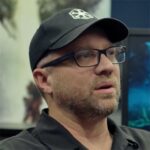
Image credit: AMD
Role on KOTOR: Lead animator
Games he’s since worked on: Mass Effect trilogy, Dragon Age: Inquisition, Anthem
Where’s at now: N/A
Current role: N/A
[Steve Gilmour left BioWare in 2017 after 20 years at the studio and retired soon thereafter, so we’ve tweaked some of his questions.]
On retirement: Yeah, I’m retired. I’m old enough to be retired right now. I’m 57, so yeah, that’s old. By gaming standards, there aren’t a lot of almost 60-year-olds making video games anymore. I’m kind of out of that world […] I did a lot — 20 years, man! And I was the lead animator on Anthem, for God’s sake, for two years. But that game broke me — there was a lot of disastrous decision-making on that thing. [Kotaku has an in-depth report on that game’s troubled development.] So it was too stressful. And I got too old. It’s just like, ‘I can’t, why am I doing this myself?’
On what’s next: I’m a huge [gaming] fan. At some point, I would love to get back in there somehow. I’m not sure how; I might even be just playing games on a Twitch stream or something like that. But I do like the idea of giving back, and I would like to find a way to do that. And it could be teaching. I worked at The Northern Alberta Institute of Technology for a year. I did talk to a lot of students and stuff like that, so that kind of mentorship-type stuff is sort of enjoyable.
Early career memories: At one point I was working on kids’ television. That’s something not a lot of people know about, but early on at BioWare, that’s something we were trying to do. We didn’t know how we were going to make money. They had hired all these animators and it’s like, ‘well, let’s get them animating.’ So at one point, we were doing a kids’ TV show called Be Alert Bert just for a very short period of time, but it was pretty hilarious. We got to practice and build little cutscenes for a television show and stuff like that, so it was kind of fun. But really, we wanted to make games — I wanted to make games. I did not want to touch kids’ TV, especially if [our game] could be Dungeons & Dragons, because that’s what they had full rein to work on the Dungeons & Dragons licence. And because I played D&D for so long, it was this was a perfect fit.
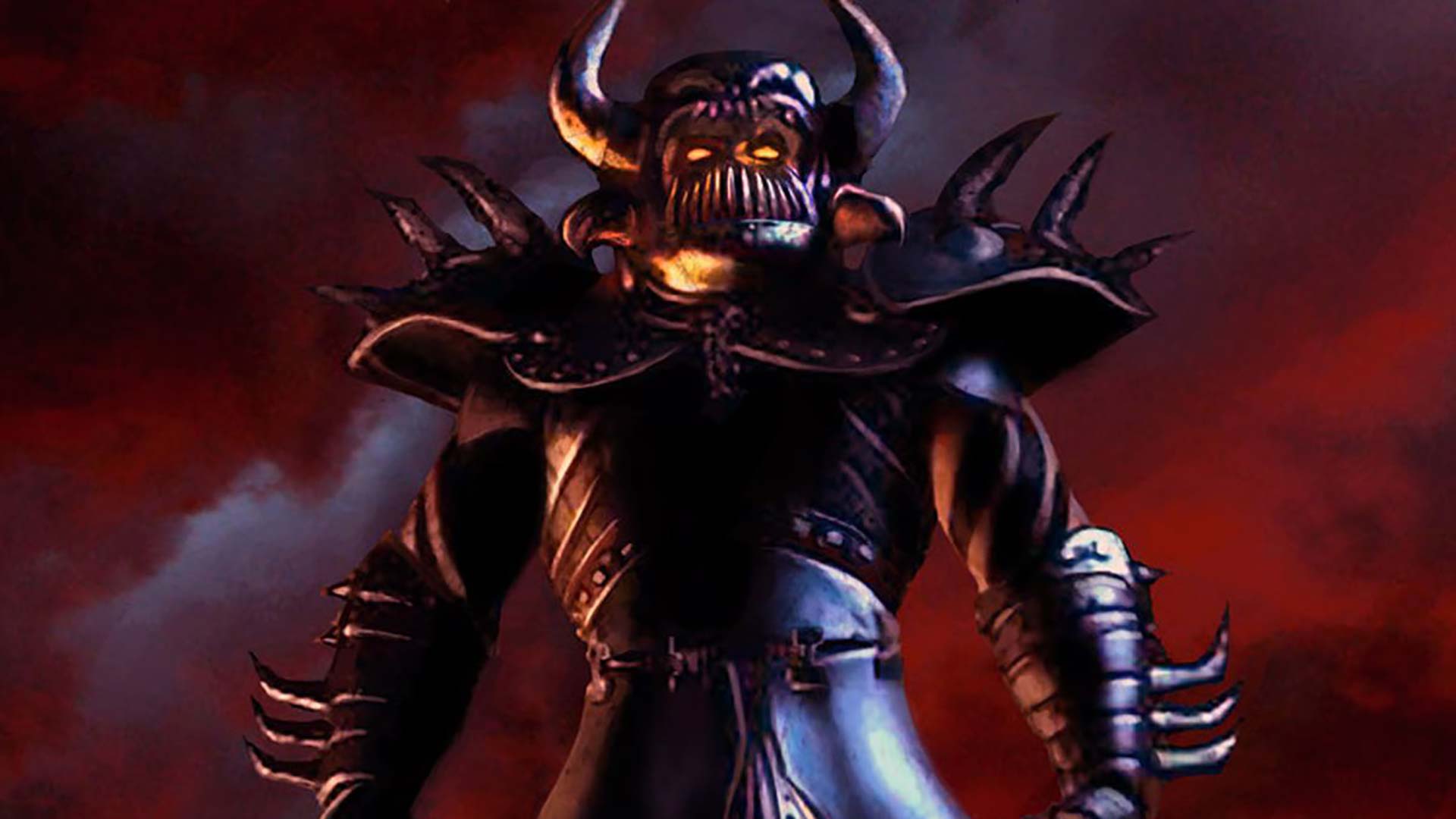
Baldur’s Gate. (Image credit: BioWare)
On the evolution of technology over the past 20 years: The way it [went] is you get a model, which would be like a creature, but it’s static, and a modeller has made this lovingly sculpted, stationary creature. Then animators — usually it starts with technical animation — will come along and they’ll build an armature, like a little skeleton on the inside. It’s digital, but the surface of the model gets applied to the skeleton underneath, and then you can move the skeleton around. And then once you have the skeleton, you can actually move the body over time and get it to animate, then you actually start animating. So I had to do that stuff all by myself. It was just me, nobody else to ask questions. This was like 1997 or 1998 — the internet’s barely functioning, YouTube doesn’t exist. Technology-wise, it was a real pioneering time, because you didn’t have people to ask questions to; there were no resources, and nobody was making this kind of stuff. Maybe three teams in the world would know what you’re talking about at that time. At least it felt like that, I’m sure there was more than that. But they’re all isolated pockets.
And communication wasn’t what it is today. You couldn’t easily communicate with other people. If you wanted to, say, find out about a piece of software that you’re using, you would have to write an email and wait for a response. Maybe they’d give you more contact info, but you’re gonna be shooting messages back and forth. There’s nothing clear or easy; it’s all a challenge. So it was always tough to do those technical challenges by yourself up in Edmonton, the middle of nowhere. And we kept hammering at this stuff and getting better and better and learning more and more until we were pretty confident we didn’t really need other people. So I learned how to do all the tech, all the setup, everything that you need to do to animate a character and get it into the video game and make sure it works correctly.
“It’s so unique and so humbling to carry the responsibility of creating something good that players are going to invest dozens or even hundreds of hours of their time into.” — Aaryn Flynn.
One of the more interesting things I did at the end [of my career] was I got a chance to work on a facial performance capture system. And that was kind of cool, being able to actually go through the technology hands-on with all the hardware, worked in a motion capture studio, set up the cameras so you can capture the face. You get these digital markers that you have to clean up in post-production, did all that stuff. Just seeing where the future’s going; reading about the AI and at some point, theoretically, with the help of an AI, just about anybody could sit down and probably author a video game. And I really look forward to that moment. I look forward to individual authorship. I look forward to the level of creativity and level of immersion that the future holds.
On helping usher in Canada’s massive game development scene: It fills me with pride that we were a little Canadian company — who knew we could pull that [KOTOR] out of our butts? It was just a great moment where we felt free enough to try to go after this stuff; we felt brave enough and capable enough to go after this thing. And we actually pulled it off — that alone is something to feel really proud of, and I do feel proud of that, and I’m proud of the people I worked with. It was a great moment in our company’s history. There were a lot of really, really talented people, and we were all kind of pulling as hard as we could in one direction.
At the same time we were working on KOTOR, there was a massively multiplayer Star Wars game called Galaxies. And so the weird thing was LucasArts kind of pitted us against each other for attention, for marketing money… And Galaxies was more their idea, it was an American team, and really, we thought we were like the pale, ugly kid brother and that these guys were going to knock it out of the park. And we shared E3 floor space, we both presented in the same space, we were hanging out with those guys, all that stuff. Until it came out… [laughs] They made some crazy-ass decisions. The first one: there are no Jedi, you can’t play a Jedi. [Note: you could eventually play as a Jedi, but the process was very difficult and convoluted.] I’m buying a Star Wars game and I can’t be a Jedi? Well, who can I be? I can be a bartender, I can be a journalist… [laughs] Wait, this is Star Wars, right?
We were working one night super late, 3am. It was me and Casey [Hudson] and I think it was Preston [Watamaniuk]. And we fired up Galaxies, because it shipped before us, to see if we’re going to be devastated. ‘Are we done? Will our game come out and no one will care?’ Casey built a Wookie and it was an okay paper-doll experience. And he finally gets to gameplay, runs around, and there’s a crab on the ground. It comes up to him, hits him, and kills him, a full-grown Wookie. He’s a six-foot-nine Wookie and the crab’s like this big, and it killed him. [laughs] We were literally on the floor laughing, we were killing ourselves. We were like, ‘Maybe we don’t need to be worried about this game, maybe we’re in okay shape.’
[…] [Then Aaryn Flynn] was the combat programmer and I was basically building the combat system. And it’s those really good relationships, really good work relationships, where you can rely on people, they would surprise you, they put in extra effort, really great team momentum… Honestly, it was the team and working with the team that, to me, was the best experience it was so professional and focused, and yet we still had fun. There was very little professional in-fighting — barely any of that stuff. It was like, ‘Roll up your sleeves, and let’s get at this thing.’ It was just magic, where everything came together. And it was so ambitious, too. ‘Yeah, you’re going to be the main character but you’re going to have amnesia and not really know who you are. And then we’ll tell you over time and it’ll work. People will be surprised that it actually worked. Oh, my God. A miracle, my friend, a miracle.
“KOTOR can’t be an anomaly. KOTOR was telling you that you can tell stories inside of this universe that have nothing to do with Skywalker and it’s still fucking cool!” — John Gallagher
On Canadian pride: I grew up in Winnipeg, and Edmonton feels like Winnipeg a lot. They have similar seasons, similar amounts of sunshine, and similar weather. I’m a big cyclist, so I ride both 180 minutes every three days, and then sometimes I’ll ride for four hours. This is one of the best cycling cities I’ve ever lived in… I love Canada because it’s Canada — it’s sane, mostly! And hopefully, we don’t get too sucked into the politics of our Southern friends. But simply, we’re still humanistic and looking after each other.
[…] Deep pride […] And you don’t think about that — we’re Canadians, we’re terrible at celebrating our own accomplishments! […] Nobody knows who BioWare is beyond the gamers, like if you asked people in Toronto on the streets. For whatever reason, gaming is not as central as it should be, certainly, as an economic driver, in terms of how much money it makes compared to, what is it, sports, music, and film altogether don’t make as much money as games? We never talk about games, it drives me nuts!
Ray Muzyka
Role on KOTOR: Executive producer/co-CEO of BioWare
Games he’s since worked on: Jade Empire, Mass Effect trilogy, Dragon Age: Origins, Dragon Age II, Star Wars: The Old Republic
Where he’s at now: Threshold Impact, a Canadian private equity firm
Current role: An angel investor in various technical, medical and social enterprises
Greg Zeschuk
Role on KOTOR: Executive producer/co-CEO of BioWare
Games he’s since worked on: Jade Empire, Mass Effect trilogy, Dragon Age: Origins, Dragon Age II, Star Wars: The Old Republic
Where he’s at now: Blind Enthusiasm, his own Edmonton brewing company
Current role: Managing the brewery, two microbreweries (Market and the Monolith), and the popular Edmonton eatery Biera
Aaryn Flynn
Role on KOTOR: Programmer
Games he’s since worked on: Jade Empire and Mass Effect (as a programmer), Mass Effect 2, 3 and Andromeda, Dragon Age trilogy, Star Wars: The Old Republic and Anthem in various leadership roles, including BioWare general manager
Where he’s at now: Inflexion (Edmonton)
Current role: CEO overseeing development of Nightingale, a shared world fantasy survival IP
Reflecting on KOTOR‘s legacy: It’s hugely humbling. It’s a credit to Ray [Muzyka] and Greg [Zeschuk] and everybody who built the studio up, the reputation that they had, that LucasArts would trust BioWare with such an important opportunity. I was just a programmer who was keen to see if I could develop some things. And I think a lot of folks here at [Inflexion] now — we’re still based in Edmonton, we’re six blocks from where BioWare’s studio is now. I think a lot of folks here, it’s easy to think that somewhere where you live, you have to live like in Hollywood, or you have live in some specific special place to contribute to these things that matter to you, and you don’t, right? You’ve got to work hard, and you’ve got to be connected to your friends, and you’ve got to be smart and passionate about something and you’ve got to invest yourself in it and sacrifice and then you can contribute to all sorts of things that are going to be appreciated the whole world over.
I travelled to China in 2018 and got to talk about some of the games I worked on, and I was surprised by how many people knew [about] the games that worked on in the West. I was just shocked. I had no idea they would even know what that is, but sure enough, they were very gracious about that. The impact — the reach — that games can have is just so special. It’s so unique and so humbling to carry the responsibility of creating something good that players are going to invest dozens or even hundreds of hours of their time into. But you can do it anywhere — you’ve just got to work hard. Everybody’s working hard in this industry.
On helping usher in Canada’s massive game development scene: It’s really cool. I can remember being at university and thinking to myself, ‘First of all, I doubt I’d ever get to make games, but then secondly, I probably have to move somewhere.’ And sure enough, by the luck of the draw, BioWare was in Edmonton where I was going to school. It was just such an incredibly fortunate set of circumstances for me. And now, between remote work, and the richness of the ecosystem in Canada and everything, you can contribute to world-class games anywhere you want. It’s such a different industry nowadays. At the same time, what remains is it’s still hard to make games. There’s a lot of cool stuff you could do nowadays that you couldn’t do even five years ago, but it’s still hard to make games. It’s still about what players ultimately want to invest their time in and love and how are they going to have fun, and it’s still about us trying to learn from them and take our own best ideas and practice them in the games that we make and make sure that they’re working and that they’re resonating with players.
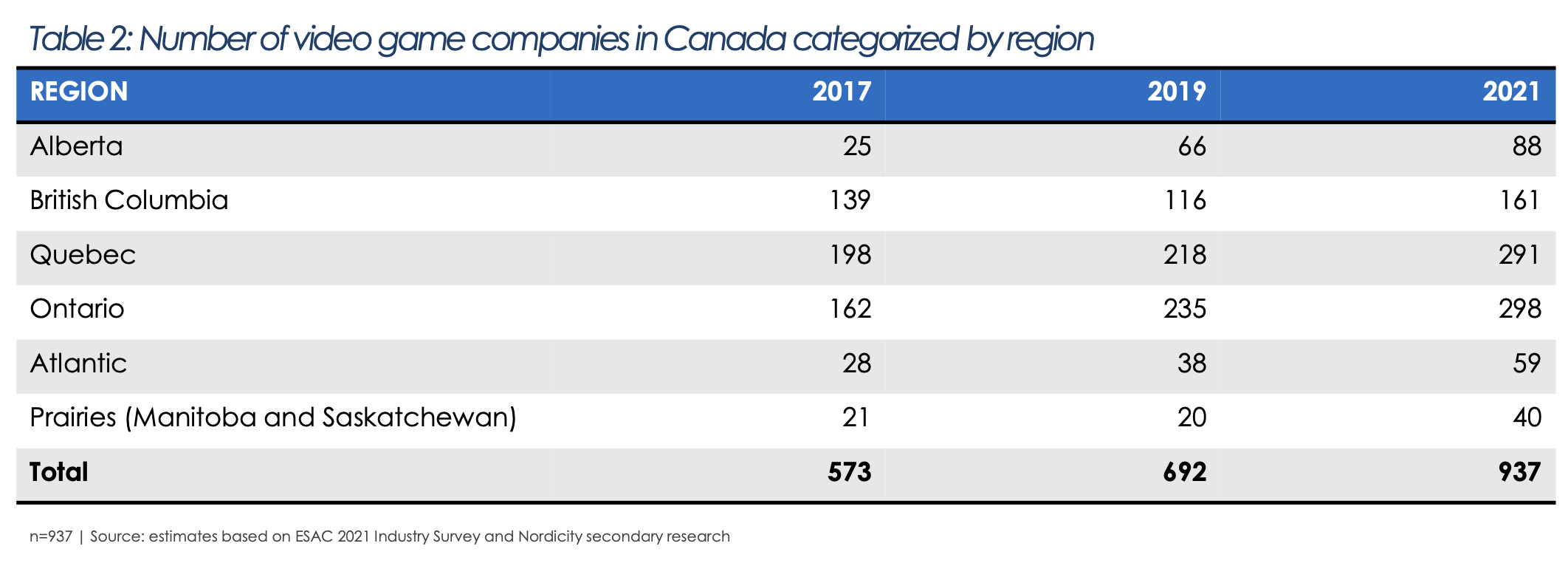
Alberta’s gaming space has grown quite a bit in the 20 years since KOTOR, per 2021 data. (Image credit: Entertainment Software Association of Canada)
On remaining in Canada while some other BioWare alums have gone elsewhere: There’s a practical answer, which is: I met a girl and she’s great, and she’s the love of my life, and her life is here, and that’s how we’ve got to do it. But there is a more sort of evocative answer to that question, too, which is that there are a lot of good people in Edmonton. The universities are world-class when it comes to technical excellence, there are a lot of creative folks here in Edmonton, and there are a lot of people who think very, very creatively about what they want to do. There’s talent now, thanks to the legacy of BioWare over 25 years, there’s a community of game developers here, now better than there ever was. And while it’s still very small, compared to, like, Montreal or Vancouver, it’s big enough that it’s working and developers from different studios get together and chat and sometimes they move and sometimes they look back. That’s the system working.
That’s the ecosystem as it should be — a healthy vibrant thing where games launch and hopefully, they have some success and then that success brings energy and money and value into the system. And then, therefore, that value then flows and moves around and results in other studios benefiting because people create their own studios. I think it’s working well. Edmonton is a really nice city. It’s got a lot of the things you need. And then with remote work now what it is, [Inflexion has] people who work with us who live in the U.K., who live in Montreal and Vancouver. And so it’s less about, ‘Can one ecosystem provide anything and everything you need to build a game?’ and more ‘Can it provide enough of what you need and then you can supplement it with other things?’
On his shift to leadership roles: I miss programming. I still try to dabble in it because the same reason I got into it still exists, even though I’m 25 years older. It’s just a very cool thing, especially nowadays, with AI and stuff, there are so many neat things you could do. But I watch the young engineers get into Unreal [Engine] and do cool things and I’m like, ‘I can’t do that, I don’t know how you’re doing that, that’s amazing.’ Certainly, leading a group of 130 people is a different set of challenges. Culture probably remains my number one focus now as what we want to be successful, and I try to draw lessons from the old days of BioWare. What made us successful back then was a lot of hard work, it’s a lot of collaboration. Ray [Muzyka] and Greg [Zeschuk] did an excellent job of creating, especially in the early days, a very positive culture — a culture of people who were expected to be their best selves and work with each other in that collaborative spirit. I think their medical training is what did that — they didn’t come from a traditional entertainment background or anything, so the archetype of a movie producer or somebody banging the table and saying, ‘We gotta get this done!’ wasn’t them.

The first game from Aaryn Flynn’s Inflexion studio, Nightingale, is a shared-world fantasy survival-crafting game. (Image credit: Inflexion)
They were this curious couple of guys who wanted to just talk about things and would always encourage conversation about things in the same way you’d go to your doctor and they’d say, ‘Well, tell me what’s going on.’ And you’re just like, ‘Well, you’re my doctor, I’ll tell you, I’ll open up.’ [laughs] They were really good at creating that environment in the early days. But then, of course, we worked way too hard in the grand scheme of things. It was a lot of crunch back then, we didn’t have a lot of the tools we have now or a lot of the understanding of things. And so as we think about the culture at Inflexion, we want all that good stuff but we don’t want the difficult stuff anymore — the stuff that burned people out or drained people. So I think a lot about that, and I work with colleagues who think about that, too, and we plan and we adjust and we try to iterate on our culture to get the best of all that.
On what makes a compelling game world: I don’t know that there’s a secret sauce. I think what players want does change a little bit over time, but what I think is consistent is the desire to be surprised, the desire to have your investment in a world rewarded with fantastic moments or interesting gameplay and such. So as we build a survival crafting game [in Nightingale], we’ve chosen to put more emphasis on world-building than some other games do. That’s a risk we’re taking because I believe that people do want to invest, people are curious about worlds, and with the technology of today, we can build really interesting worlds far faster and far deeper than we could on KOTOR, for example. Obviously, we inherited a lot of the Star Wars mythology that helped, but at the same time, nowadays, we can present players with what we call ‘fantastical spaces in meaningful places.’ That’s our studio purpose — this idea of creating fantastical spaces, dungeons, and open worlds and magical islands and these things, and then encouraging players to find and create meaning in those places. ‘This is meaningful to me because I helped an NPC here, and that NPC was thankful to me, or it’s meaningful to me because I built a place here and I called it home. And it was mine, and it was unique and it was my effort that did it. Or it’s meaningful to me because I played with my friends and we accomplished something that otherwise couldn’t have been accomplished had we not gotten together and thought about this and worked together and helped each other.
And that’s the power of world-building — a context that sets that opportunity to invest and get meaning back from these things. And so that’s why we invest so much in it. And that’s what KOTOR was, right? It was this amazing new Star Wars world that had enough in common with Star Wars that you understood the rules of it — there are lightsabers, there are blasters, there are rogues and droids like HK-47, and space travel like the Ebon Hawk. But now it’s new, and it’s also unique, and it’s special, and I’m in it, and I’m doing the things that I always imagined I could do if I were Luke Skywalker, if I were Obi-Wan. And so here I am. And you move along in this thing and meaning emerges — it becomes meaningful to you because of the circumstances that you’re engaging with.

Image credit: Summerfall Studios
David Gaider
Role on KOTOR: Writer
Games he’s since worked on: Dragon Age trilogy, Star Wars: The Old Republic, Anthem
Where he’s at now: Summerfall Studios (Melbourne, Australia)
Current role: Writer on Stray Gods: The Role-Playing Musical
John Gallagher

Image credit: John Gallagher
Role on KOTOR: Lead concept artist
Games he’s since worked on: Jade Empire, Mass Effect, Dragon Age: Origins, Crysis 3, Prototype 2, Sleeping Dogs
Where he’s at now/current role: Freelance entertainment illustrator for movies and TV shows, such as The Flash, Doctor Strange in the Multiverse of Madness, The Boys and The Expanse; also sells his art online
[Gallagher is in a unique position because he’s since shifted from working on games to film and television. Since he’s so prolific in the entertainment space, we posed him some completely different questions.]
Reflecting on KOTOR‘s legacy: It’s such a high honour. I pinch myself all the time going, ‘Seriously, this is my life? This is amazing.’ And I don’t say that in a dismissive way, either, because the truth is, I worked my butt off, for many, many, many years. But a lot of people work their butts off, and I’m super fortunate […] I am waiting for the standalone stories that don’t dovetail with any of the conventional narrative timeline. It’s clearly an enormous opportunity to tell incredible new stories that I think fans are dying for […] It seems as if they’re so terrified of making something compelling. I don’t envy [The Mandalorian‘s] Jon Favreau or Dave Filoni trying to win these battles to tell these stories. I really don’t. All the power to them. I don’t know how they managed to get half of what they got made, made.
But again, it’s still framed up inside the Skywalker timeline, and it’s really not that interesting […] I think KOTOR can’t be an anomaly. KOTOR was telling you that you can tell stories inside of this universe that have nothing to do with Skywalker and it’s still fucking cool! You can just dive into it and enjoy the hell out of it and really dig into characters you care about, stories you can get behind, and struggles that you understand. It’s not that difficult.
What goes into designing a character that looks authentic to Star Wars: Star Wars has its own kind of prime directive when it comes to design. It’s a three-second silhouette recognition rule that if you can’t tell what it is, in three seconds, you’ve failed, the design has failed. So some of that’s pretty easy; like a droid is a droid as a droid — a bipedal protocol droid is a bipedal protocol droid. But Sith, there’s certainly a recognition factor that has to be immediate, and Jedi [have] the same recognition factor. I think it’s very simple to ‘paper dolly’ the aesthetic down so that it’s understood quickly because it has to translate universally. Even if you don’t hear a word of dialogue, you still have to have a very, very good, clear idea. And that’s part of the genius of the franchise is that you know absolutely, immediately who’s who and what’s what, without a word of dialogue without any exposition. So there’s a master’s touch in that regard, so that’s very easy as a designer to lock in on.
Like when you know that you’re designing a bunch of Sith, here are the general rules for Sith. And because they’ve already conquered hyperspace, a lot of tech just goes through highs and lows, because it’s probably very similar to our own world where tech does fall down, unless there are people driving it in a really significant way. And since I don’t think there are any real billionaires driving things in the Star Wars universe, a lot of the stuff still feels very familiar, like a tram freighter still feels like a tram freighter. The Sith brutalism of the ’70s still very much persists in those simple, elegant lines that [Star Wars illustrator] Ralph McQuarrie made as the definitive bad guys. And so they’re going to be grey, it’s not gonna be bright blue. They’re very much a combination of palette and form language. With Star Wars, that makes it very easy, because I grew up copying that shit [laughs]. So for me, it was already kind of welded into my head a little bit. I think I may have had a leg up on some other designers only in that sense.
It was very much a chance to take our knowledge out for a run and see what we could add, augment and enhance, and tweak a little bit, but still feel very familiar because we didn’t want to give an alienating strange, bizarre experience for Star Wars fans. […] Someone who’s 10 years old, like I was [watching Star Wars], should be able to play the game and enjoy it, perhaps in a different way than a 40-year-old would. But you still hope that the pleasure pathway is the same — that it’s just an undiluted thrill. It’s kind of awesome. You’re doing some cool stuff. You’re in this amazing place. Who doesn’t want to jump on a starship and go through hyperspace? So we wanted to visually capture some of that energy, but also [add] a little bit more mystery — a slightly different era that still throws to everything that feels familiar in terms of the form language and the shape alphabet of the world. And I think we were pretty successful in that regard.
On remaining in Canada while some other BioWare alums have gone elsewhere: I love Vancouver. I’ve been here for 15 years now and I couldn’t imagine living anywhere else […] And I’ve had this explained to me in no uncertain terms, declaratively, that Vancouver is a world-class city. People who live here may not feel that way, and that’s fine, but their perception doesn’t matter. In terms of the reality of our surroundings, there’s all the major companies that you’d ever work for you and with are all here. They all have studios here. All the majors may not have permanent studios here, but they certainly have enough of a reach and influence between here Toronto, London and LA, and Atlanta. I don’t need to be anywhere. And [with] film — very much, especially after COVID — it’s been proven categorically, emphatically, that working from home is not only viable, it’s preferred. Because you get happier, more productive people, generally speaking. I can certainly say for myself that I’ve been far more productive, and far happier, working from home.
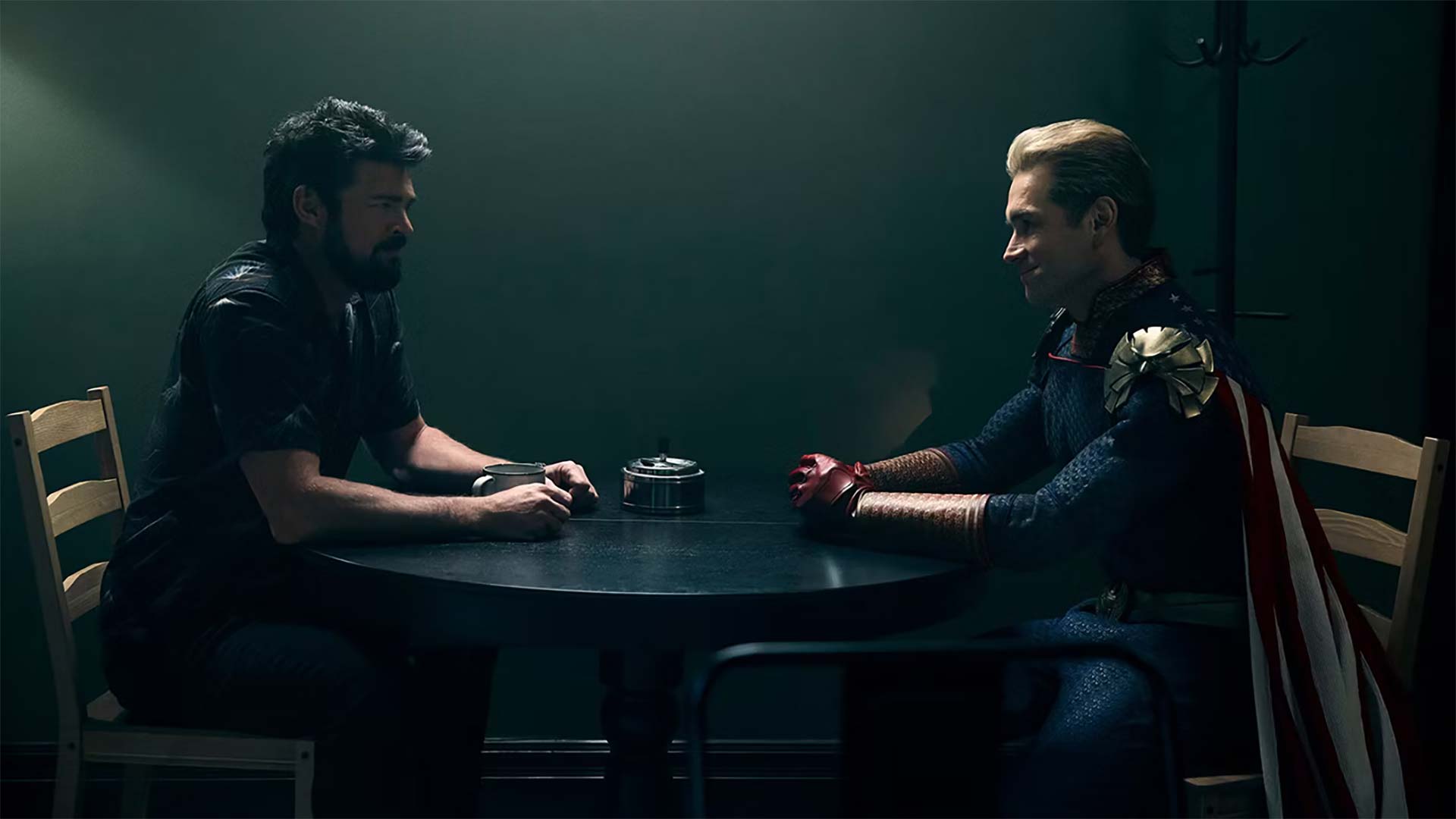
Gallagher contributed to Season 3 of Prime Video’s popular The Boys series. (Image credit: Prime Video)
Favourite project: I have to say, and please put this up in lights: The Boys. It was the first time I ever had the trifecta happen for me, where I really love the source material, I love the show and then working on it was the best professional experience. And I’ve had a lot of really good experiences, so for me to say that, to be declarative like that, it’s got to be something. It was just a joy — an absolute joy to work on. It’s every bit as fun as you would think it is: ‘I bet those sons of bitches making that show are having a blast.’ You’re right!
Next projects: “Look for me at comic conventions across Canada!” […] Please, by all means, if you visit any of the Fan Expos in Canada — I try to go to Fan Expo Calgary, Vancouver, Edmonton and [Toronto], and to try and get to more [cities], like Montreal, and Niagara Falls, Winnipeg… Again, [I’m] proudly Canadian, so I’m happy to show up and support and be a part of shows anywhere in the country.
[Elsewhere, he teases his involvement in the upcoming Netflix show The Abandons from Sons of Anarchy creator Kurt Sutter, starring Gillian Anderson and Lena Headey, which is set to film in Calgary.]
“I’m working on that, it’s been an absolute blast. It’s so violent. [laughs] So wonderful. So beautiful. There’s definitely almost medieval-level violence in this day. Just gorgeous mayhem, a lot of men versus nature and men lose horribly. I’ll encapsulate it this way: Leo DiCaprio getting thrown around by a grizzly bear is literally the series. It’s just balls-to-the-wall crazy.”
Jennifer Hale
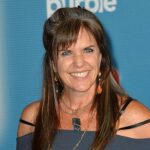
Image credit: Shutterstock
Role on KOTOR: Voice of Bastila
Games she’s since worked on: Mass Effect, Metal Gear series, Overwatch, BioShock Infinite, Ratchet & Clank: Rift Apart, Bayonetta 3 and many, many more
Where she’s at now: N/A
Latest role: The PS VR2 game Synapse, in which she plays the handler, Clara, who helps the player stop a terrorist
[Note: our interview with Hale was conducted weeks prior to the SAG-AFTRA actors strike.]
On helping usher in Canada’s massive game development scene: I am so incredibly proud to be part of the Canadian gaming scene. It’s powerful. It’s beautiful. It’s so cool. It’s pioneering in so many ways. I was born in Canada, I was born in Labrador, but I grew up in the States, and I only came back here a few years ago. To be able to stand tall on both sides of my ancestry is such a gift. And again, it’s the teams — these are the coolest people. They’re just the coolest people who are beautiful writers, incredible creators, really bold, and they stand for things that are extra, and so needed. And I love, love, love that I get to be a part of it.
Her latest role, Synapse: The first thing that drew me to it was that the team [nDreams] reached out and they said [fellow Metal Gear star and Canadian] David Hayter is doing this, and I said, ‘Yes!’ [laughs] David’s one of my closest friends, and we’ve been friends since the early- to mid-90s, so that’s an automatic ‘Yes’ for me. That drew me to the game immediately. And they sent this presentation deck over that was just stunning, and the character was so great. One of the things I loved about what we did was when they called me, they referenced my body of work as a draw for working with me, and they didn’t tie me to it. Clara is very distinct — she has a very distinct speech pattern, and she has a very specific thought pattern. Her history is fascinating, and where her relationship with the colonel [Hayter’s villainous character] goes is so interesting.
On the evolution of technology over the past 20 years: It’s been really fun riding the technology wave in gaming. If you look back at the acting style of the original KOTOR or the first of the Mass Effect trilogy, the acting had to be slightly pushed, or that’s where we were guided, because the visuals — in terms of rendering human beings’ facial nuances, physical nuances, et cetera — hadn’t come along yet. But even through the progression of the Mass Effect trilogy, just between one and three, there was such a vast difference. By the time we got to 3, that wonderful truism of on-camera acting that I love so much — it’s one of my favourite things about it, which is that thought registers on camera — became true in the booth. And I could drop into my favourite form of acting, which is just to deeply live that moment, without really having to push any piece of it, and just have an experience. So then the player, that wonderful human at the other end who’s actually playing the game, gets to have an experience as well — like a true experience.
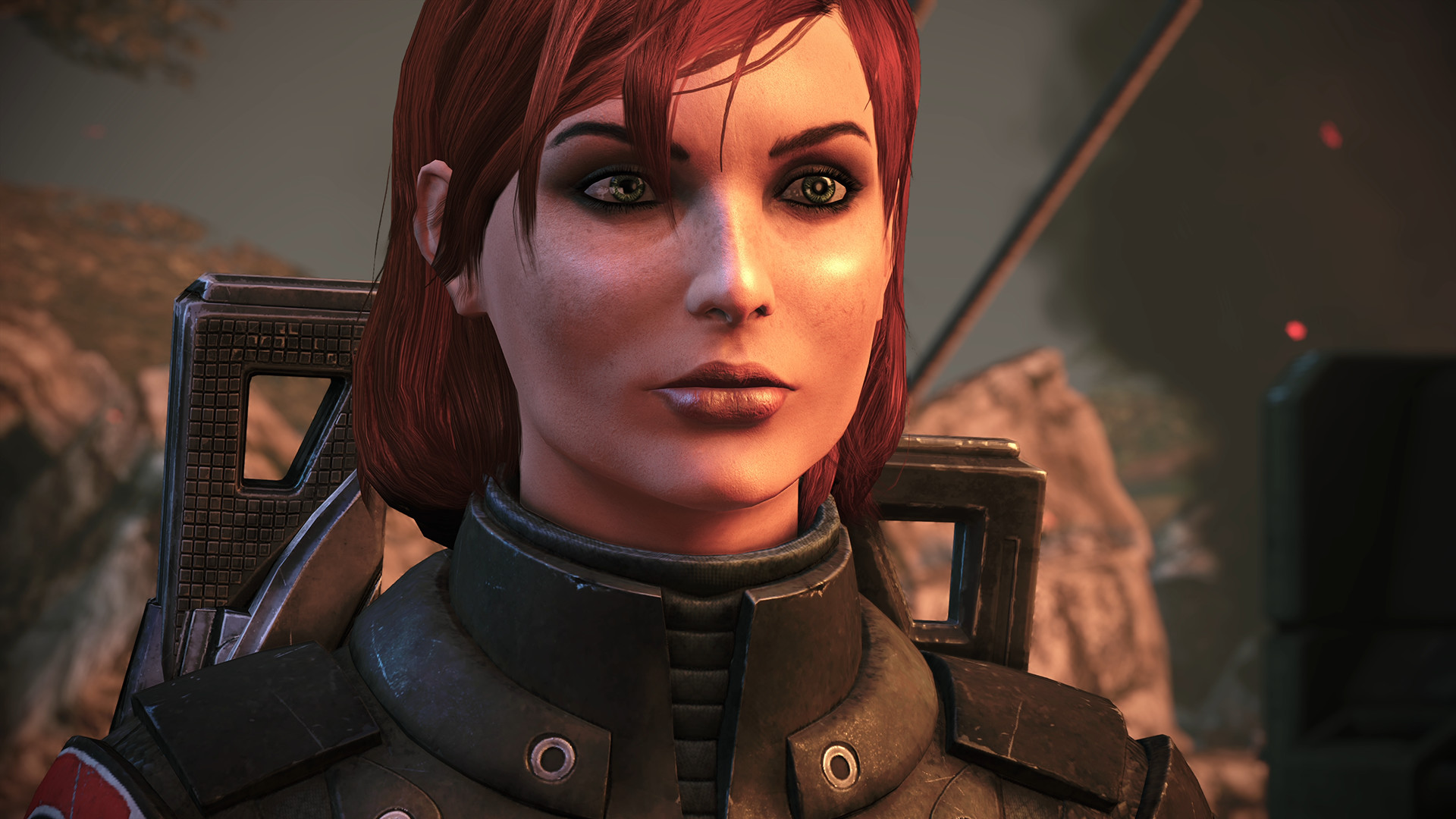
Arguably Hale’s most popular work has been for BioWare’s Mass Effect trilogy, in which she voices the female version of the player character, Commander Shepard. (Image credit: BioWare)
There’s a difference when you watch a movie and I think this speaks to the progression that acting has been able to make because the technology has grown so vastly. You can watch a movie and you can see an actor’s performance, and you can see them acting. And it’s great — it’s great stuff. You’re like, ‘Wow, that’s impressive.’ And then you watch a movie. And an actor is just living something very specific and you’re just shattered or you’re speechless. That’s the distance we’ve been able to come [in gaming] and I find it absolutely thrilling.
How the advancement of technology has affected her work: Technology always informs my choices, absolutely. With Synapse, you’re guided through this game by our voices, because you don’t actually see us. You’re living in the game in a very different way, so that piece has to be dialed in, but honestly, I think that happens so much in the writing. That’s a real responsibility and weight on the writing team. Because the truth is, for me, it doesn’t matter what I’m doing, I’m throwing down 1,000,000 percent no matter what it is. There are definitely technical considerations, like when I work in film and TV, there are certain physical parameters. Hit this mark here, be here, make sure you’re lined up correctly, you’re in your light, et cetera, et cetera. Those are things you just have to keep running in the background.
When I’m doing animation, there are things there for any kind of voice acting — I have to stay within this sort of three-inch cube placed perfectly six inches from the mic at the correct height. And those things are true when I’m doing motion capture; the way I approach it is my body’s doing a bit of a theatre performance, because the movement needs to be very distinct and very clear, very expressed in the body. But the voice piece of it is more like film. Of course, if you’re doing like something like Knack or whatever, you’re getting a little more sitcom there. But Halo, God of War, Iron Man VR, were all very much film-like with the whole theatre, body experience. And then Iron Man, we had some fabulous — not stunt work — but just fun stuff hanging off scaffoldings and whatnot.
Next projects: Journey to Foundation, a fall 2023 VR game based on Isaac Asimov’s iconic sci-fi works — “I love that story, I love my character!” She teases a yet-to-be-revealed animated series in which she gets to be in her “happy place and sing two songs while also being “just absolutely rotten and completely over the top.” Bringing everything full circle, she ends by throwing her hat in the ring to be in Casey Hudson’s next sci-fi game. “I don’t know what they’re working on. But I cannot wait to see what they’re going to do, and I so hope I get to work with them at some point!
These interviews have been edited for style, language and clarity.
Star Wars: Knights of the Old Republic is available on Xbox One, Xbox Series X/S, Nintendo Switch, PC, Android and iOS.
Header image credit: John Gallagher
Update: 19/07/2023 — The kids’ show that Gilmour refers to is actually called Be Alert Bert, not “Beware Bert.” We’ve updated this accordingly.
MobileSyrup may earn a commission from purchases made via our links, which helps fund the journalism we provide free on our website. These links do not influence our editorial content. Support us here.

